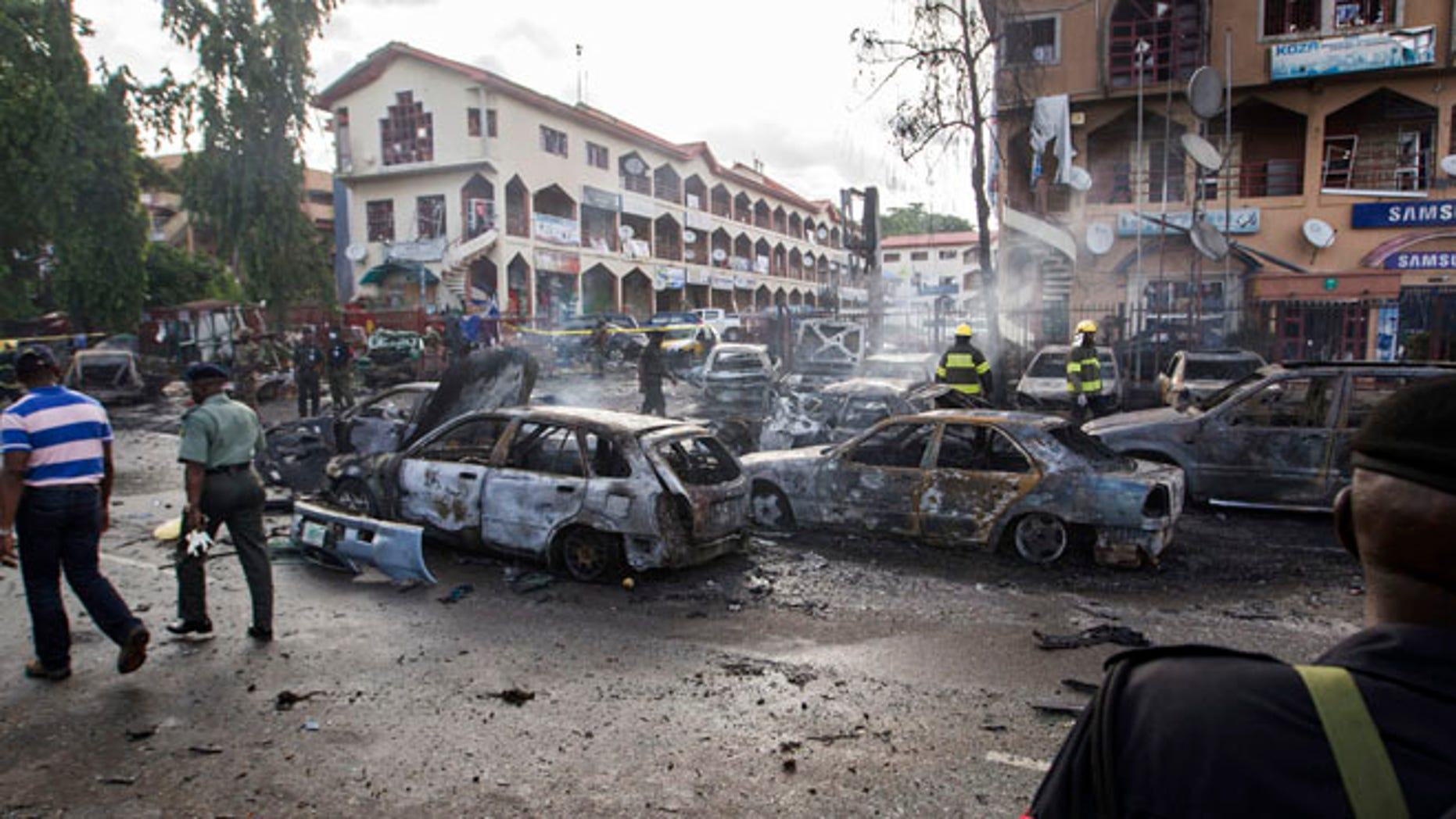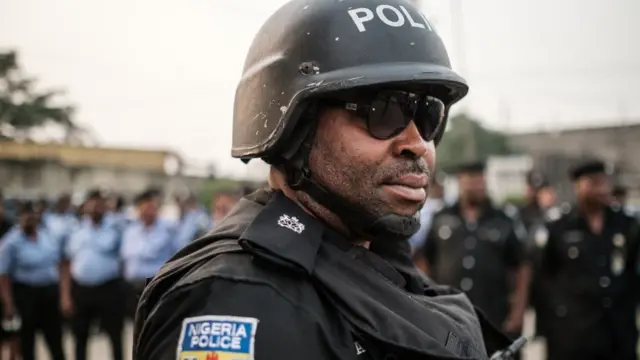The recent Boko Haram attack on a Nigerian army base in Borno State has raised serious concerns about security in the region, especially on Christmas Eve when the assault occurred. Terrorists targeted the Forward Operating Base in Wajiroko, employing drone strikes that resulted in injuries to at least six soldiers. Eyewitness accounts describe a chaotic scene where sporadic gunfire preceded a massive explosion, highlighting the audacity of the attackers. Despite being repelled by the troops, the incident underscores the growing use of advanced tactics by the insurgents, including armed drones carrying locally fabricated grenades. This attack not only damages military equipment but also poses a significant threat to the safety and morale of the soldiers stationed in this volatile area.
In a distressing escalation of violence, a recent incident involving an assault on a military facility in Borno State illustrates the ongoing struggles against militant groups in Nigeria. The attack, characterized by the use of unmanned aerial vehicles, reflects a tactical shift among insurgents who are increasingly employing sophisticated methods to target military operations. Reports indicate that soldiers sustained injuries during this brazen offensive, raising alarms about the effectiveness of current defense mechanisms. As the Nigerian army confronts this formidable foe, the implications of such terrorist activities extend beyond immediate casualties, affecting regional stability and security strategies. The persistence of these confrontations demonstrates the complexities of combating insurgency in a landscape rife with challenges.
Boko Haram Attack on Nigerian Army Base: A Christmas Assault
On Christmas Eve, Boko Haram launched a significant attack on a Nigerian army base in Wajiroko, Borno State. This unexpected assault involved the use of drones, marking a concerning shift in the tactics employed by the insurgents. Reports indicate that the Forward Operating Base (FOB) was first bombarded with mortars and small arms fire before the terrorists unleashed drone strikes, which injured at least six soldiers. This coordinated attack highlights the persistent threat posed by Boko Haram, even during festive periods when military vigilance is often lower.
Witness accounts describe a harrowing scene, as soldiers at the base reacted swiftly to repel the initial assault. However, the subsequent drone strikes caught them off guard, leading to significant damage to military equipment and injuries among the troops. The military’s assessment of the situation reveals a troubling trend, as the insurgents adapt their strategies to incorporate technology that poses new challenges for the Nigerian army. As the conflict in the region escalates, the need for enhanced security measures and intelligence gathering becomes increasingly critical.
Impact of Drone Strikes on Military Operations in Borno State
The recent drone strikes by Boko Haram have raised alarms about the implications for military operations in Borno State. These attacks not only inflict physical harm on soldiers but also threaten the operational integrity of the Nigerian army. The use of drones signifies a tactical evolution in the conflict, as insurgents leverage advanced technology to gain an upper hand. The Nigerian military must now adapt to counter these evolving threats, which could include investing in drone detection systems and improving air defense capabilities.
Moreover, the psychological impact on the troops cannot be overlooked. Following the attack, soldiers’ morale is at risk of being undermined, especially when faced with the reality of being targeted by unmanned aerial vehicles. The potential for further attacks using drone technology necessitates a reassessment of current military strategies and training programs. It also highlights the importance of international cooperation in addressing the growing sophistication of terrorist tactics in Nigeria, as well as the need for comprehensive approaches to ensure the safety and security of military personnel.
The Role of the Nigerian Army in Combating Boko Haram
The Nigerian army has been at the forefront of combating Boko Haram for nearly two decades, facing one of the most challenging insurgencies in recent history. Despite claims of significant victories against the group, incidents like the recent drone strike at the FOB in Wajiroko reveal the ongoing struggle. The military’s ability to adapt and respond to such threats is crucial, as the insurgents continue to exploit weaknesses in security protocols. In response to these challenges, the army is urged to enhance its operational strategies and invest in advanced technology to effectively counteract the insurgency.
In addition to military engagement, the army’s role extends to community engagement and humanitarian efforts in the affected regions. By addressing the underlying issues that fuel insurgency, such as poverty and lack of education, the Nigerian military can work towards long-term solutions that not only aim to defeat Boko Haram but also rebuild trust within the communities. The dual approach of military action coupled with community development is essential for sustainable peace in Borno State and beyond.
Casualties and Damage: The Cost of the Boko Haram Assault
The recent attack on the Nigerian army base resulted in notable casualties and damage, with at least six soldiers reported injured. Such incidents underscore the human cost of the ongoing conflict, as soldiers bravely face the threats posed by Boko Haram. The damage to military equipment, including a gun truck, further complicates the army’s operational capabilities. Each attack not only inflicts physical harm but also erodes the resources necessary for effective military operations against insurgents.
Moreover, the casualties sustained during these attacks reflect the broader impact of the conflict on military personnel and their families. The psychological toll of witnessing comrades injured or killed in action can have lasting effects on soldiers’ mental health and overall morale. As the Nigerian army continues to engage in combat operations, it is vital to ensure that adequate support systems are in place for affected soldiers, including medical care and psychological counseling, to help them cope with the stresses of war.
The Evolving Tactics of Boko Haram Insurgents
Boko Haram has consistently evolved its tactics to maintain pressure on the Nigerian military. The recent use of drones in their attacks signifies a shift towards more sophisticated methods of warfare, which poses significant challenges for traditional military responses. Understanding these evolving tactics is crucial for the Nigerian army to devise effective counter-strategies. As the insurgents adopt new technologies, the military must enhance its intelligence capabilities and develop specialized units trained to combat aerial threats.
This evolution in tactics also highlights the importance of international collaboration in counter-terrorism efforts. The Nigerian military can benefit from partnerships with nations that possess advanced technology and expertise in drone warfare. By sharing intelligence and best practices, Nigeria can better prepare its forces to face the complexities of modern insurgency. The fight against Boko Haram is not just a national issue but a regional concern that requires a coordinated global response to eradicate the threat of terrorism in West Africa.
Community Response to Boko Haram Attacks
The community response to Boko Haram attacks is critical in the fight against insurgency. Local populations often bear the brunt of the violence, and their resilience can play a significant role in countering the influence of the terrorists. Following the Christmas Eve attack, community members in Borno State have rallied to support the injured soldiers and their families, showcasing solidarity in the face of adversity. This grassroots response emphasizes the need for a strong partnership between the military and local communities to effectively combat the insurgency.
Furthermore, community engagement initiatives can help rebuild trust and foster cooperation between civilians and the military. By involving local leaders and organizations in security efforts, the Nigerian army can enhance its intelligence-gathering capabilities and create a more robust defense against future attacks. Empowering communities through education and economic opportunities can also reduce the appeal of extremist ideologies, ultimately contributing to a more stable and secure environment in Borno State.
Military Strategies for Countering Drone Warfare
In the wake of Boko Haram’s drone strikes, the Nigerian military must formulate comprehensive strategies to counter this new form of warfare. Traditional ground-based tactics may no longer suffice, necessitating the integration of advanced surveillance technologies and air defense systems. Training specialized units to detect and neutralize drone threats will be essential in protecting military installations and personnel. Additionally, investing in research and development of counter-drone technologies could significantly enhance operational effectiveness.
Moreover, the military should prioritize intelligence-sharing with international allies who have experience in combating drone warfare. Learning from the successes and failures of other nations can provide valuable insights into effective countermeasures. By adapting to the changing landscape of insurgency, the Nigerian army can improve its preparedness and response capabilities, ultimately reducing the risk of future attacks and safeguarding its troops in Borno State.
The Humanitarian Crisis in Borno State
The ongoing conflict with Boko Haram has led to a severe humanitarian crisis in Borno State. With thousands displaced and in need of assistance, the situation remains dire. The recent attack on the Nigerian army base exacerbates the challenges faced by humanitarian organizations working in the region. As insecurity continues to rise, access to affected populations becomes increasingly difficult, leaving many without essential services such as food, shelter, and medical care.
Furthermore, the psychological impact on the local population cannot be overlooked. Many survivors of Boko Haram attacks suffer from trauma and mental health issues, necessitating comprehensive support systems. International aid agencies must work alongside the Nigerian government and military to provide not only immediate relief but also long-term solutions that address the root causes of the crisis. Ensuring the safety of aid workers and facilitating access to vulnerable communities is crucial in alleviating the suffering caused by the protracted conflict.
Future Prospects for Peace in Nigeria
The path to peace in Nigeria is fraught with challenges, particularly in regions heavily impacted by Boko Haram’s insurgency. However, the resilience of the Nigerian military and the determination of local communities provide hope for a more stable future. The recent attacks serve as a reminder of the complexities involved in achieving lasting peace, but they also highlight the need for a united front against terrorism. Engaging multiple stakeholders, including government, military, and civil society, is essential in developing a comprehensive peace strategy.
Additionally, addressing underlying socio-economic issues is crucial for sustainable peace. Initiatives focusing on education, employment, and community development can significantly reduce the factors that fuel insurgency. By fostering an environment where citizens feel secure and valued, Nigeria can work towards diminishing the appeal of extremist ideologies. The commitment to peace requires not only military action but also a holistic approach that prioritizes the welfare of the people affected by the conflict.
Frequently Asked Questions
What happened during the recent Boko Haram attack on a Nigerian army base in Borno State?
On Christmas Eve, Boko Haram launched a drone strike on the Forward Operating Base in Wajiroko, Borno State, injuring at least six soldiers. The attack involved multiple armed drones carrying locally fabricated grenades, following an initial assault involving mortars and firearms.
How did the Nigerian army respond to the Boko Haram attack in Borno State?
The soldiers at the Forward Operating Base in Wajiroko managed to repel the initial assault by Boko Haram, forcing the terrorists to withdraw. However, they were later targeted by a drone strike, which caused injuries to several troops and damage to military equipment.
What were the casualties reported from the Boko Haram drone strike on the Nigerian army base?
During the Boko Haram attack on the Nigerian army base, five soldiers sustained injuries. Fortunately, there were no reported fatalities, although the Nigerian military’s gun truck was damaged during the assault.
What is the current situation following the Boko Haram attack on the army base in Wajiroko, Borno State?
After the Boko Haram attack, the situation at the Forward Operating Base in Wajiroko is described as calm but highly unpredictable. Troops’ morale and fighting efficiency are considered satisfactory despite the recent drone strike.
How has the Nigerian military addressed the ongoing threat of Boko Haram attacks?
The Nigerian military has claimed that Boko Haram has been largely defeated, although the group continues to launch attacks, such as the recent drone strike in Borno State. The military emphasizes its efforts to maintain security and protect its bases from such terrorist activities.
What long-term impact has Boko Haram had on the regions of Adamawa, Borno, and Yobe?
Boko Haram has caused significant long-term impacts in Adamawa, Borno, and Yobe, resulting in over 100,000 deaths and the displacement of millions of people. The ongoing insurgency has disrupted lives and created a humanitarian crisis in these regions.
| Key Point | Details |
|---|---|
| Attack Location | Wajiroko, Damboa Local Government Area, Borno State, Nigeria |
| Date of Attack | December 24, 2023 |
| Casualties | At least 6 soldiers injured |
| Methods Used | Drones carrying grenades, mortars, and firearms |
| Military Response | Troops repelled the attack, damaging an army gun truck |
| Overall Situation | Calm but unpredictable; troops’ morale remains satisfactory |
Summary
The Boko Haram attack on December 24, 2023, highlights the ongoing threat posed by this insurgent group in Nigeria. Using drones, the terrorists targeted a military base in Borno, injuring several soldiers and damaging equipment. Despite the military’s claims of having largely defeated these extremists, incidents like this one reveal the persistent danger they pose, having caused significant casualties and displacement over the years. As Nigeria continues to battle Boko Haram, the situation remains tense and unpredictable.



